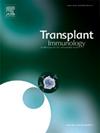Safety and efficacy of high-dose versus standard-dose influenza vaccines in hematopoietic stem cell transplant recipients: A meta-analysis of randomized controlled trials
IF 1.4
4区 医学
Q4 IMMUNOLOGY
引用次数: 0
Abstract
Given the vulnerability of hematopoietic cell transplant (HCT) patients to influenza infection and its complications, annual vaccination is recommended. However, vaccination was known to be less effective in these patients. Multiple studies have assessed various effects in HCT recipients after receiving different vaccine doses. However, the results have been inconclusive. This meta-analysis aims to provide a comprehensive analysis of the effectiveness and safety of HCT recipients when they receive a higher and standard dose of influenza vaccines. This study used PRISMA guidelines on several databases until Oct 25, 2024. We used ROB 2.0 and Review Manager 5.4 Software for further analysis. We included four low-risk of bias studies, and we conducted further analysis. The efficacy of HAI titer 1:40, >4-fold, and confirmed influenza positives was comparable in both groups, with insignificant results in each follow-up group. However, the adverse effect was found significantly higher in the high-dose group, specifically the local adverse effect (p < 0.0001). High-dose influenza vaccines showed higher adverse events and more confirmed influenza cases than standard-dose, suggesting standard-dose may be preferable post-HCT. These findings underscore the need for further research, particularly in diverse populations and vulnerable groups.
高剂量与标准剂量流感疫苗在造血干细胞移植受者中的安全性和有效性:一项随机对照试验的荟萃分析
鉴于造血细胞移植(HCT)患者对流感感染及其并发症的脆弱性,建议每年接种疫苗。然而,已知疫苗接种对这些患者的效果较差。多项研究评估了不同疫苗剂量对HCT受者的不同影响。然而,研究结果尚无定论。本荟萃分析旨在全面分析HCT受者在接受更高剂量和标准剂量流感疫苗时的有效性和安全性。该研究在2024年10月25日之前使用了几个数据库的PRISMA指南。我们使用ROB 2.0和Review Manager 5.4软件进行进一步分析。我们纳入了4项低风险偏倚研究,并进行了进一步分析。血凝素滴度≥1:40、4倍、流感确诊阳性两组疗效具有可比性,各随访组结果均不显著。然而,高剂量组的不良反应明显更高,特别是局部不良反应(p <;0.0001)。与标准剂量相比,高剂量流感疫苗显示出更高的不良事件和更多的确诊流感病例,这表明标准剂量可能是hct后更可取的。这些发现强调了进一步研究的必要性,特别是在不同人群和弱势群体中。
本文章由计算机程序翻译,如有差异,请以英文原文为准。
求助全文
约1分钟内获得全文
求助全文
来源期刊

Transplant immunology
医学-免疫学
CiteScore
2.10
自引率
13.30%
发文量
198
审稿时长
48 days
期刊介绍:
Transplant Immunology will publish up-to-date information on all aspects of the broad field it encompasses. The journal will be directed at (basic) scientists, tissue typers, transplant physicians and surgeons, and research and data on all immunological aspects of organ-, tissue- and (haematopoietic) stem cell transplantation are of potential interest to the readers of Transplant Immunology. Original papers, Review articles and Hypotheses will be considered for publication and submitted manuscripts will be rapidly peer-reviewed and published. They will be judged on the basis of scientific merit, originality, timeliness and quality.
 求助内容:
求助内容: 应助结果提醒方式:
应助结果提醒方式:


